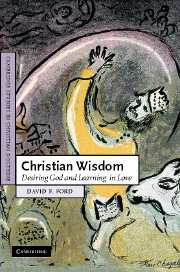Book contents
- Frontmatter
- Contents
- Acknowledgements
- Introduction: theology as wisdom
- 1 Wisdom cries
- 2 A wisdom interpretation of scripture
- 3 Job!
- 4 Job and post-Holocaust wisdom
- 5 Jesus, the Spirit and desire: wisdom christology
- 6 Learning to live in the Spirit: tradition and worship
- 7 Loving the God of wisdom
- 8 An inter-faith wisdom: scriptural reasoning between Jews, Christians and Muslims
- 9 An interdisciplinary wisdom: knowledge, formation and collegiality in the negotiable university
- 10 An interpersonal wisdom: L'Arche, learning disability and the Gospel of John
- Conclusion: love's wisdom
- Index of citations
- Subject index
6 - Learning to live in the Spirit: tradition and worship
Published online by Cambridge University Press: 22 September 2009
- Frontmatter
- Contents
- Acknowledgements
- Introduction: theology as wisdom
- 1 Wisdom cries
- 2 A wisdom interpretation of scripture
- 3 Job!
- 4 Job and post-Holocaust wisdom
- 5 Jesus, the Spirit and desire: wisdom christology
- 6 Learning to live in the Spirit: tradition and worship
- 7 Loving the God of wisdom
- 8 An inter-faith wisdom: scriptural reasoning between Jews, Christians and Muslims
- 9 An interdisciplinary wisdom: knowledge, formation and collegiality in the negotiable university
- 10 An interpersonal wisdom: L'Arche, learning disability and the Gospel of John
- Conclusion: love's wisdom
- Index of citations
- Subject index
Summary
Learning to live in the Spirit is the encompassing activity of Christian discipleship after Pentecost.
The first five chapters have so far offered an understanding of Christian wisdom largely through scriptural interpretation. The conception of this wisdom has been as the discernment of cries in the midst of a historical existence summoned towards God's future. Because of that summons, desire for God and God's purposes is wisdom's embracing ‘mood’. Indicatives, imperatives, interrogatives and subjunctives are variously in play both in the texts and in their interpretations, but, in responding to the cries of God and of the world, faith's core mood is optative – and first in the passive voice: we are desired by God. This wisdom's main practice is constantly renewed engagement with scripture as summarised in the nine theses and ten maxims at the end of chapter 2. The rereading of scripture in the Spirit as described there connects with a range of engagements that are in principle unlimited – with other people, spheres of life, disciplines, arts, cultures, religions and so on. The succeeding chapters have attempted to give samples of that wisdom interpretation of scripture, mainly through the books of Job, Luke, Acts and 1 Corinthians. There has been no attempt to be exhaustive, the main aim being to exemplify an approach that not only requires further working out through the other books of the Bible and their intertextuality but also requires constant rereading of Job, Luke, Acts and 1 Corinthians.
- Type
- Chapter
- Information
- Christian WisdomDesiring God and Learning in Love, pp. 192 - 224Publisher: Cambridge University PressPrint publication year: 2007

